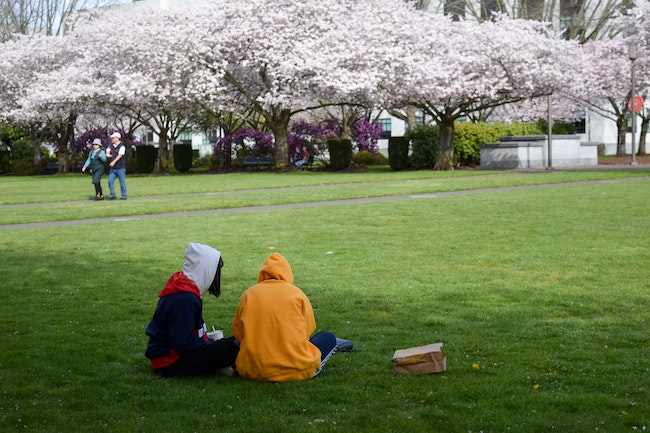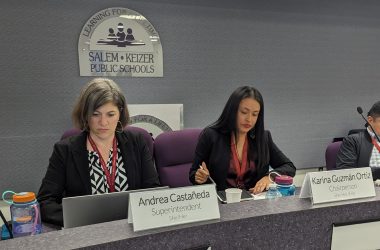
People sat in Oregon State Capitol State Park while the cherry trees were blooming on March 17, 2020. (Saphara Harrell/Salem Reporter)
Oregonians are pessimistic about solving the worsening homelessness crisis and climate change, according to a recent statewide survey by the Oregon Values and Beliefs Center.
Nearly three out of four of those surveyed said humans have a small or no chance of solving homelessness before it’s too late.
Oregonians were slightly more optimistic about solving the climate crisis, with two-thirds reporting they thought there was a small or no chance humans can solve it before it’s too late.
From Aug. 9 -17 Oregon Values and Beliefs Center asked 1,154 Oregon residents aged 18 and older questions about their values and beliefs. The same survey asked questions about Covid, finding that most Oregonians trust scientists and doctors above all sources of information about Covid, while parents are split on having their children attend in-person school this fall.
People were more pessimistic about climate change than solving communicable diseases like Covid, racial discrimination or voting rights.
Phil Carver, co-coordinator 350 Salem, said the challenge is to communicate to people that the climate crisis is bad, but not so bad they lose hope. 350.org is an international environmental organization with local chapters dedicated to addressing the climate crisis.
“There’s a lot of reasons to be hopeful but people often fluctuate between laid back, unconcerned to panic. The rational place to be is somewhere in between those two. This problem won’t go away without strong action and changes in lifestyle,” he said. “It’s not yet to the point that we would talk about it being an existential threat.”
He said wildfires and the recent heat wave were eye-opening events that got a lot of people alert to the seriousness of the problem.
Carver pointed to solar and electric vehicles are becoming cheaper. He said Pacific Power is planning to close nine of its 14 coal-fired power plants in the next 15 years.
“The facts are out there that we can turn this around,” he said. “It’s somewhat like a very large ocean liner it takes a very long time to turn.”
The city of Salem started working on a climate action plan in Aug. 2020 and is close to completing it. There’s a work session with the Salem City Council on Monday, Sept. 20.
Patricia Farrell, Salem’s parks and natural resources planning manager, said not many of the people the climate task force has talked to commented pessimistically, “though the subject is daunting.”
“Instead, people are more inclined towards the urgency of doing something. People want to know what they, as individuals, can do and how their choices matter,” she said in an email.
She said the results of the survey show the need to build more resiliency in the community, which is part of the Climate Action Plan.
More than half of Oregonians blamed hotter, drier weather for increased wildfires rather than forestry practices that allow fuels to build up.
The survey found respondents working in agriculture or forestry were nearly split in their opinions, with 40% saying climate change was the bigger culprit and 35% saying forestry practices that allow excess fuel to build up were more to blame.
Oregonians who favor government regulations ranked policies promoting tree planting and prioritizing renewable energy highest, with about 80% supporting them.
A majority supported increased restriction on industrial emissions, 73%, and tougher fuel efficiency standards, 69%.
Cutting red meat was the least popular action that individuals could take to reduce climate change, the survey said. About a third of respondents said they should reduce consumption by “none or very little” while a quarter said people should reduce their consumption by a quarter.
More than a third of Oregonians said climate change has had dramatic physical or emotional impacts, with people under 45 more likely to report impacts.
The survey said people of color are more likely to report significant or dramatic emotional or physical impacts because of climate change, as compared to white residents 47% to 37%, however the survey cautioned that Black, Indigenous and people of color “are not a monolith; the grouping represents a wide diversity of races and ethnicities. The findings included in this memo should not be construed such that all people of color are believed to share the same opinions.”
Contact reporter Saphara Harrell at 503-549-6250, [email protected].
JUST THE FACTS, FOR SALEM – We report on your community with care and depth, fairness and accuracy. Get local news that matters to you. Subscribe to Salem Reporter starting at $5 a month. Click I want to subscribe!









